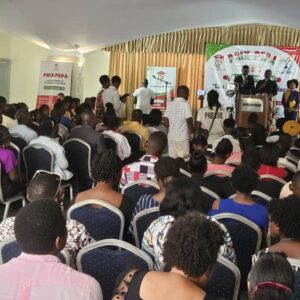By Marie-Frantz Joachim*
Submitted to AlterPresse on June 7, 2024
About thirty years ago, against the detractors of the Ministry for the Status of Women, I set about developing an argument to justify its reason for existence. Even today, circumstances seem to want to force me to do the same exercise with the difference that, this time, the threat of suppression concerns several ministries. Obviously, the questioning of the Ministry brings together Haitian political families. With each new government, progressive, reactionary or conservative, a serious threat weighs on the future of the Ministry.
We will not stop repeating that the merits of the Ministry lie in the persistence of the patriarchal system which organizes the oppression of women by assigning them an inferior role in production systems and by establishing several sources of control including the domestic work, culture, sexuality, violence and the state.
From this perspective, as long as this subordination of women in relation to men persists, women will continue to resist and demand the establishment of mechanisms capable of helping them to free themselves from oppression and to detach themselves and dissubjugate themselves from norms. patriarchal. In this sense, exclusively feminine spaces – including women’s organizations, institutional mechanisms for promoting women’s rights – and positive actions in favor of women are part of all efforts made to correct the misdeeds of patriarchy, in particular late access of women to education and politics. If we consider the presence of women in elective positions as an important marker of the health of democracy and the evolution of gender equality, the latest statistics relating to the representation of women in the 50th legislature (4 women /149), once again confirm the importance of the Ministry, particularly in a context of transition whose main mandate is to organize elections.
Indeed, the immeasurable scale of the tragedy caused by criminal gangs affects women in their bodies, affects their mental health and their well-being. The Haitian State has the thorny duty to act urgently on behalf of these thousands of survivors of sexual violence to help them recover their bodies after break-in, defilement and killing. An essential exercise for the involvement of women in reconstruction, governance and politics.
It is established that countries engaged in any process of national reconstruction following post-conflict periods benefit from unprecedented opportunities to strengthen gender equality in policies and programs. The Ministry, whose mission is, among other things, to transform attitudes and behaviors in the highest echelons of the State and to guarantee that the strategic interests of women are taken into account in policies, its role is undeniable in promoting Peace and social cohesion, an essential element for establishing and maintaining order in a society. More than ever, it has a crucial role to play in respecting the principle of zero tolerance in relation to gender-based violence.
And this is priceless!
It is up to a highly strategic institutional mechanism, not to a unit or department within a ministry, to undertake and coordinate all actions aimed at documenting cases of sexual violence and bringing them to the appropriate person. from a perspective of justice to break with the culture of impunity. Incidentally, there is an inconsistency in the initiatives of the ministries combining several related sectors. Actions are undertaken at the discretion of the Ministry holder, following their own skills, experiences and priorities. The concerns of 52% of the population risk being drowned out or pushed to the back burner in the case of a merger between ministries.
Let’s go over a little history. In 1987, a Secretary of State was established by the government of Leslie Manigat. It is the limit of this mechanism which leads me to join more than five (5) thousand women, marching in the streets of Port-au-Prince – at the call of the Solidarity of Haitian Women/Sofa – to demand a ministry to bring the cause of women to the highest authorities of the State. The main slogan is: “Yon ministè fanm pou pote kòz fanm nan pi wo nivo leta”.
It was March 8, 1991.
At the National Palace, those in charge of the Presidency decide to open the gate to welcome the demonstrators. Notebook of demands in hand, I climb the stairs to the square where there are Jean Bertrand Aristide and Marie Laurence Jocelyn Lassègue, respectively President and Minister of Communication.
I present the demands relating to the economic, social, cultural and political rights of women after having established an inventory of the situation. The list closes with the need for a Ministry for the Status of Women to transform these demands into public policies in favor of women.
In 1993, during the period of the bloody military coup, with the government in exile, I had the opportunity to go to Washington to meet those responsible and reiterate the demands of women while emphasizing the importance of this institutional mechanism and the role it plays in making the voices of Haitian women heard in all international spaces of reflection as a prelude to the fourth major United Nations World Conference on Women.
In 1994, Dr. Lise Marie Dejean informed SOFA that she was contacted by the then Prime Minister, Smark Michel, to hold the Ministry. Convinced of the role of this mechanism in the pursuit of gender equality objectives, I immediately give my favorable opinion. Responsibility for establishing the Ministry throughout the territory falls to me.
I am developing my plan with a timetable validated by the Minister. This involves consulting women’s organizations across the country to choose regional coordinators. I travel all over the country meeting women’s groups. During the assemblies, I explain to them the rationale, the role of the Ministry as well as the criteria and profiles of women expected to fulfill the function of regional representative.
The next step is supporting coordinators in team building at the municipal level and in setting up a legal training program so that they are able to adequately provide quality services. proximity in terms of reception, listening and advice to women victims of violence.
Since the birth of the Ministry, the idea of bringing public services closer to the female population has been present. From January 2007, survivors of sexual assault can have free access to a medical certificate regardless of where they are in the country. The memorandum of understanding on the granting and free medical certificate relating to sexual and/or marital assault signed by the Ministries of Women’s Affairs, Health and Justice, extends the issuance of the one and only juridico-legal document in case of sexual assault to any licensed doctor. The normative role assigned to the ministry requires it to develop a set of tools to collect data at the national level on gender-based violence with a view to guaranteeing their reliability and for better decision-making in this area.
The existence of the Ministry precedes section “H” of the Beijing Platform for Action dealing with institutional mechanisms. Adopted by Haiti in 1995, this document requires the government to take measures to promote gender equality. It should be noted, moreover, that the preparatory meetings at the United Nations are an opportunity for Haiti, of which I was then a delegate, to make its contribution by proposing section “J” relating to “women and media”. Haiti’s contribution fundamentally addresses gender representations and stereotypes in media content and the roles of women in the communications industry. The Ministry thus ensures effective and quality representation and visibility of the country in international bodies.
It is the responsibility of the Ministry to ensure the application and harmonization of international instruments relating to women’s rights to which Haiti is a party. The plans on Equality and violence against women contribute not only to closing the gaps between women and men but also to having sufficient data to report to international bodies on the progress made by Haiti in terms of ‘Equality. Periodically, the Ministry produces a report which evaluates the application of the Convention on the Elimination of All Forms of Discrimination against Women.
The modification and bringing into conformity of legislation is part of a dynamic of harmonization. The 2006 decree criminalizing rape aligns with the Belém do Para Convention, the 2014 law making fathers responsible for their offspring, whether born outside or outside of marriage, is aligned with the convention on rights of the child, while the constitutional quota of at least 30% of women fits with the CEDAW.
Naturally, the results would be much more significant if the Ministry could escape the maneuvers of politicians who always seek to exploit it, or even distort it. However, its usefulness for women both from a national and international point of view no longer needs to be demonstrated.
The Ministry, seen from a strategic angle in terms of Equality, instead of having its existence questioned, should rather find coherent support from the government, including sufficient and sustainable human and financial resources to ensure in a more effective and systematic manner: design, preparation, coordination of policies and their implementation, the viability and legitimacy of feminist and women’s organizations as well as strengthening the institutional capacity of state civil servants by promoting a work culture that integrates gender . It is high time that this institutional mechanism, which has already been part of the Haitian administrative landscape for three decades, is free from any threat to its existence.
*Linguist/Feminist





